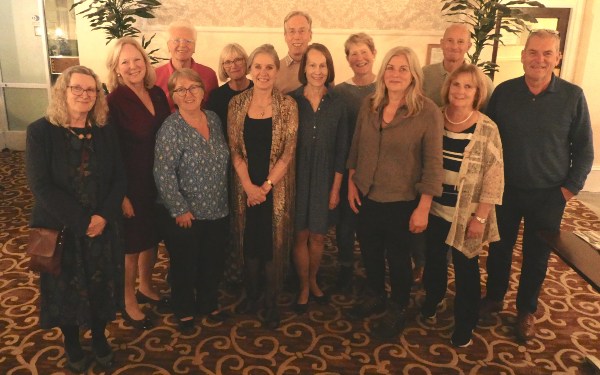
In 1974, around twenty young people began a four-year course at the University of Bradford, combining a BA in applied social studies with a certificate of qualification in social work (CQSW).
Many of us have kept in touch and most meet every few years as a group.
Although mostly retired now, we have all had long careers in health and social care, working in the public, charity and private sector, and with the full range of client groups. Some of us have focused on frontline social work, while others have diversified into other fields, such as counselling and research, become managers or taken on very senior roles at a local or national level.
We share a deep sense of commitment to the work we’ve done and a belief that it’s been a job worth doing.
This year, it is 50 years since we started the course, and between us, we have clocked up around a thousand years of employment. In the spirit of passing on something of our collective experience to the next generation of social workers, we share some of our reflections here.
Positive changes in social work
Although we acknowledge there is further to go, we have seen marked improvements in various aspects of health and social care provision. For example:
Diversity, equity and inclusion
Across the board, there is better ethnic and cultural diversity in the workforce. As a social work course, we were 100% white British and we then practised in settings where there were few staff from black, Asian or minority ethnic groups.
Thankfully, this has changed and multi ethnic teams have transformed practice and enabled meaningful links to be built with diverse communities.
Linked with this, we have seen anti-racist practice (again, hardly on the agenda when we trained) and diversity, equity and inclusion become core values in all social work sectors.
It is normal, now, to see women in management roles – in marked contrast to the beginning of our careers, when men were heavily advantaged in terms of promotion, often taking senior roles within two or three years of qualification.
Professionalisation
We have become properly regulated and there are improved career pathways for practitioners to remain in practice and share their experience with new staff.
Social worker safety
Thankfully, there is also greater attention to personal safety for social workers. At the beginning of our careers, there were no mobile phones, and it was common to do solo evening visits to unknown households.
One of us remembers being pinned against the wall by somebody with a knife and threatened in an interview room with a gun. The tragic case of Isabel Schwarz, murdered by a service user in 1984, focused attention on this issue and improved conditions for us all.
The introduction of specialist teams
It is hard to believe that when we set out to practice in 1978, we were qualified as ‘generic’ social workers. Typical caseloads included managing older people’s care accommodation alongside family support and the full range of statutory child care services.
After minimal additional training, we received ‘authorised worker’ status, allowing us to undertake mental health assessments, sometimes leading to compulsory hospital admission of adults displaying a range of distressed behaviours. We were ill equipped for this, and some of us recall operating alone, feeling inadequate, and at times, fearful for our own safety.
For the most part, therefore, we welcomed the introduction of ‘specialist teams’ through the 1980s and 1990s and the development of knowledge and skills that went alongside it.
But there were losses too, including the broader and more radical vision for social work that had inspired many of us during our training. This was referred to by the Seebohm Committee as ‘a wider conception of social service, directed to the well-being of the whole community and not only to social casualties, and seeing the community it serves as the basis of its authority, resources and effectiveness’ (Seebohm Report, 1968, p147).
Safeguarding
It is easy to underestimate the improvements in the safeguarding of children, young people and adults. The sexual abuse of children was barely on the agenda before the 1980s and systems to protect children and adults from harm were limited.
Enhanced recognition and understanding are now widespread across agencies, communities and organisations.
Redressing power imbalances
Although we acknowledge the power imbalances inherent in our profession, it is also important to recognise that there have been significant changes which have mitigated these, hopefully forming a foundation for ongoing progress. Some examples are:
- The Children Act 1989: one cohesive act encompassing both private and public law and, for the first time, focusing our minds on partnership with parents, greater interagency collaboration and involving children in agreed plans. It was the first piece of legislation to place a specific duty on local authorities to address children’s need in terms of race, culture, religion and language, and to state that at all times the welfare of the child was the paramount concern. It followed that the court process became more professional for us and more empowering for children and their families.
- Similarly groundbreaking in adult services, the NHS and Community Care Act 1990 and Care Act 2014 shifted the dial in terms of conversations with vulnerable people about meeting their needs and how they would like this to happen. Similarly, we have seen a tremendous change in how we view people who experience dementia. We have moved away from the ‘senile dementia’ of the medical model, to a concern for the individual’s ‘personhood’ and the dignity and respect that comes with this. We know now that this approach to people who live with dementia will improve their wellbeing.
- The introduction of the independent reviewing system and the role of the children’s guardian, both of which introduced independent scrutiny of services for children and enhanced the voice of the child. The expectation that the case manager could impartially chair children’s reviews or that the child had no independent representation in court now seems absurd and dangerous.
- Vast improvements in services for young people leaving care (how sad to remember that these were virtually non-existent when we began our careers) and a stronger platform for young people through organisations such as Coram Voice and The Black Care Experience.
Negative changes
We are of one voice when it comes to the negative changes we have witnessed and the areas where we feel much-needed progress has failed to materialize. We list them briefly here in the knowledge that most of them remain problematic in the profession, and in the hope that they will be addressed in the near future:
- Too much emphasis on tick box and pro forma assessments. These rarely encapsulate what is actually happening for a child or adult and may mean that important information is lost.
- Unmanageable caseloads. This is not only a dangerous situation for service users but also for staff who can easily ‘burn out’ or leave the profession.
- The introduction of ‘care management’. This downgraded much social work activity to assembling packages of care and overseeing their delivery. The importance of establishing a relationship with the people we worked with was downgraded and the profession became more managerialised and bureaucratised.
- The erosion of services for older people. At the start of our careers, we had a range of flexible resources at our disposal, allowing us to support older people in their homes or to help them make partial or complete moves into local residential care. The present paucity of state resources is shameful, and we have witnessed political cowardice in not creating and implementing a long-term plan for social care.
- The pervasive damage of austerity. It was clear from the outset that the pressure to disinvest from preventative services in order to maintain statutory responsibilities on reduced budgets would have long lasting and damaging impact. Sadly, this proved to be the case, setting back services, undermining social work practice and causing incalculable harm to many, many people.
- The demonisation of social workers in the press. Public concern about the death and serious injury of children and carefully conducted enquiries are to be expected and managed. However, the feeding frenzy of press blame and harassment of social workers has been extremely damaging. More thoughtful reporting in recent years has led to a better balanced and nuanced appreciation of the dilemmas facing social workers and others making decisions in the lives of children in particular.
- The marginalisation of fathers. We recall that the majority of our involvement with families did not include engaging with the father, and we see only a small amount of progress in this, with fathers often absent from key meetings and decision making, and maternity services and parenting debates mostly centring around the mother.
Messages to our younger colleagues
We have reflected on what has sustained us through our careers and what we have learned along the way. We have distilled some key messages, hoping that some of them will resonate and be helpful to younger colleagues:
- Look for diversity in what you do and don’t avoid challenges, but don’t stay for too long in a field of work or an organisation that drains your confidence or stifles your curiosity. Explore options for working as a social worker in different sectors, or for a change of direction: you have many transferable skills!
- Realise that a successful career is not defined by a particular role or level. Rather it is about doing and achieving what works for you and will make you look back and feel you are glad you did it. You, not others, define your career success.
- Be a good listener and tune in to the world as others see and experience it. This applies at all levels, with service users, colleagues and other agencies, and within teams. Look for opportunities to agree/have common ground.
- Be your authentic self – you will be happier, and your work will be better.
- Working alongside vulnerable people can take a personal toll. It is essential that you feel supported by your manager and the organisation. Help to create a positive work culture and make time for fun and team spirit.
- Nurture your personal life and outside interests. Set boundaries between work and non-work time. Take your leave. Take time to recognise your successes and find ways to celebrate them.
- Be aware of the power that you carry. Use it responsibly and find ways of mitigating it where possible. Stay grounded in the ethics and values underpinning the job.
- We cannot always ‘put it right’ for people. Recognise your mistakes and learn from them, but accept that sometimes, despite your best endeavours, there will be negative outcomes.
- When you have concerns, stand up for your views in a positive way and don’t be worried about speaking truth to power. Important changes often begin through this route.
And finally – we are heartened to see talented and committed young people entering social work. It is a multi-faceted and interesting career, and few of us would have wanted anything different.
But there will always be challenges along the way. As one of us commented: “You will need the literary skills of Charles Dickens, the heart of an angel and the hide of a rhinoceros!!”
This article involved contributions from Philip Sands, Gabrielle Jerome, Alison O’Sullivan, Rosie Benaim, John Allot, Anne Cherry, Shirley Cramer, David Behan, Debbie Olley and Mary Beek, all of whom studied on the University of Bradford applied social studies course from 1974-78,







 Bournemouth, Christchurch and Poole
Bournemouth, Christchurch and Poole  Hampshire County Council
Hampshire County Council  Oxfordshire County Council
Oxfordshire County Council  South Gloucestershire Council
South Gloucestershire Council  Wokingham Borough Council
Wokingham Borough Council  Webinar: building a practice framework with the influence of practitioner voice
Webinar: building a practice framework with the influence of practitioner voice  ‘They don’t have to retell their story’: building long-lasting relationships with children and young people
‘They don’t have to retell their story’: building long-lasting relationships with children and young people  Podcast: returning to social work after becoming a first-time parent
Podcast: returning to social work after becoming a first-time parent  How managers are inspiring social workers to progress in their careers
How managers are inspiring social workers to progress in their careers  Workforce Insights – showcasing a selection of the sector’s top recruiters
Workforce Insights – showcasing a selection of the sector’s top recruiters 

 Facebook
Facebook X
X LinkedIn
LinkedIn Instagram
Instagram
Thank you all so much for your many contributions! So proud to have worked at Bradford University over many years myself – the four year degree programme offered an opportunity to develop thoughtful creative practitioners like yourselves.
Sadly, I think many social work programs today are really struggling in universities that are also struggling. I do hope this newish government revisits the mistaken and socially unjust investments that have been made by previous governments into fast tracks like Frontline. …they are very costly, do not help with retention and are part of a very unfair landscape where bursaries for courses such as Bradford have been frozen for many years.
It would be great to hear your thoughts on social work education when you next meet and maybe, just maybe, there might be some good news for you to tell us about if we do have the change of policy that I think is needed
Sadly the biggest conflict with social work is local authority new elite business managers who have no social care core values.
Absolutely Richard, the advent of ‘context free’ management is a curse and hinderance to those who seek to uphold social care core values. The bottom line has taken precedence over quality of outcomes for those in society vulnerable enough to need our services.
Sensible precis.
Would just like to add, it’s a shame about the possible appropriate workers, who suffer from the “professional ” academic emphasis, when it comes to qualities required to fulfil the role of Social Worker. There’s an army of workers out there who, wouldn’t know the difference between Bowlby and Rutter but nevertheless, would not baulk at statutory visits to a threatening parent.
Who are these “new elite business manager” ? What is their professional background? Are they the budget holders? How are they different to past senior managers ?
Forgot to mention value for money, since Thatcher.
This is so spot on I qualified in the 80s and am semi retired I went at 60 but now mentor students and apprentices
What an insightful and passionate article. It’s very inspiring to see people who have remained in the profession for so long. Thank you for sharing your thoughts.
I really enjoyed this article. I was surprised about the paragraph on safeguarding being so small. the scope of what safeguarding social workers do is so vast and wide ranging as compared to 70’s,80’s and 90’s.
I’m in my 18 year as social worker and my 40th year in social care. I agree with the comments about moving around different fields using those accquired and transferable skills.
Nice article withy great insight. Touched on all critical elements in the profession.